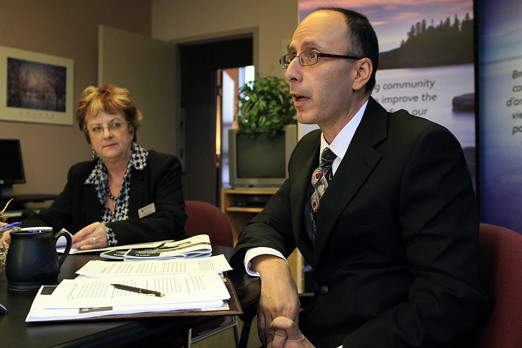Incentives are just one way Northwestern Ontario can use to keep post-secondary students working in the region when school is done, says the author of a recent graduate-retention study.
Lakehead University economics professor Livio Di Matteo said other provinces, like Saskatchewan and Nova Scotia, are offering up to $20,000 in tax credits for graduates who chose to remain in-province, and there’s no reason Northwestern Ontario leaders can’t petition this province to provide similar incentives.
Di Matteo said he knows it would have to be handled delicately.
"These are delicate fiscal times, and we certainly wouldn’t want to embark on anything that wasn’t fiscally responsible," he said Thursday, after making a series of six recommendations he believes will help the region develop its own graduate retention and recruitment strategy.
"Saskatchewan used to have a tax credit for graduates, and now they’ve gone into a tuition rebate program, so graduates who graduate and reside in Saskatchewan through their income tax get a rebate on their tuition."
That type of carrot on a stick could come in handily in Northwestern Ontario, where about half of all university students come from afar and have few, if any, non-school ties to the area. Colleges do a little better he added, as skilled trade jobs are more plentiful.
Di Matteo said it isn’t unheard of for Queen’s Park to single out certain section of Ontario for specialized treatment.
"The provincial government has done other types of programs that are region-specific, whether it’s the Northern Energy Tax Credit or health travel funds. Northern graduate incentives are certainly something that can be done," he said.
Among his other suggestions are the development of a more extensive alumni study to track career paths after graduation, both past and future graduates, a detailed survey of employment needs, an aboriginal graduate study and sector-specific recruitment, particularly in the mining field.
Graduate retention is not an area where Northwester Ontario is doing nearly well enough at, he added, but the information gleaned from his recommendations could help the sparsely populated region prosper and encourage more businesses to set up shop.
There are both demand and supply factors involved, he said.
Rampant out-migration by students is not all about jobs, Di Matteo added. But more opportunity would help.
"The region is sparsely populated, the population is spread out over a very large expanse. I think we’ve got barely 10 per cent of the population of the province and 90 per cent of the land mass. So you don’t have as many large, dense nodes of opportunity. You have five major urban centres, probably three or four that are larger than towns, and that’s about it."
Southern Ontario is much more densely populated, which tend to create more jobs.
Information like what he’s asking for could potentially help reverse the trend, said Marg Scott, the executive director of the provincially funded North Superior Workforce Planning Board.
Scott said she gets regular calls from potential employers looking for the data, but many end all consideration of Northwestern Ontario as a place to invest when it’s not available.
A knowledge-based economy, which is poised to give the resource-based historical economy a run for its money, can’t happen without it.
"If you have a business for 10 to 15 people up to 500, they want to know what workforce development they have, what talents are here, what talents might be here in the future and where they need to perhaps top up," Scott said.
"This information is fundamental to the development of business, and certainly looking at long-range globalization and putting Thunder Bay on the map, this kind of information is absolutely critical."
Sign in or register
- Messages
- Post a Listing
- Your Listings
- Your Profile
- Your Subscriptions
- Your Likes
- Your Business
- Support Local News
- Payment History
Registered Users
Already have an account?
New Users
Create a free account.
